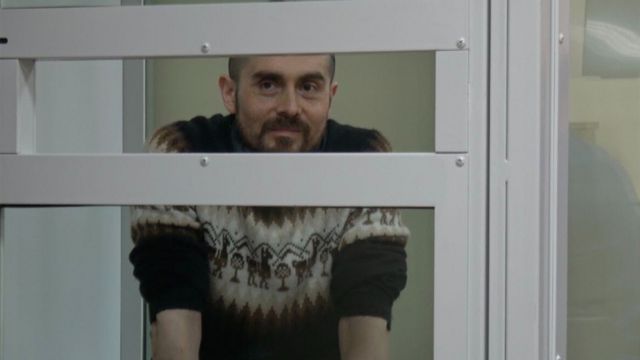Daniel Dias-Strukov during the trial The Moscow Regional Court sentenced the citizen of Spain, Russia and Peru, Daniel Sixto Diaz-Strukov, to seven years of strict regime penal colony on charges of drug trafficking. He was facing life imprisonment.
The Moscow Regional Court found a Peruvian-born healer and herbalist guilty of attempted large-scale drug trafficking and sentenced him to seven years in prison and a fine of 300,000 rubles.
The prosecutor asked the court to sentence Dias-Strukov to nine and a half years in prison, impose a fine and order him to undergo drug addiction treatment.
Initially, Strokov faced a life sentence for trafficking and attempted trafficking on a particularly large scale, so his case was considered by a jury.
At the end of February, the jury returned a partial acquittal, declaring him innocent of drug smuggling. The jury found Dias-Strukov guilty of attempted drug trafficking, but found him eligible for leniency, meaning that the judge could impose no more than two-thirds of the maximum sentence under the charge.
Daniel Dias-Strukov has been in pre-trial detention since March 2017. He was arrested at the post office where he had come to pick up a package containing a healing potion called “Dragon’s Blood” that he had ordered from Peru. In 10 out of 11 bottles of the decoction, customs officials found DMT – a psychedelic substance listed as a banned drug in Russia.
We explain quickly, simply, and clearly what happened, why it matters, and what happens next. Episodes End of story. Podcast advertising.
During the search of Strokov’s house, they also found ground San Pedro cactus and flour made from coca leaves. The amount of DMT was calculated by forensic experts based on the total mass of the dried residue of the mixture, which was 2.7 kg. 8 kg of ground cactus was considered equivalent to the same amount of pure mescaline, and 2.7 kg of coca leaves was considered equivalent to the same weight of pure cocaine.
Dias-Strukova was charged with smuggling and attempted sale of drugs on a particularly large scale (Part 4 of Article 229.1 and Part 5 of Article 228.1 of the Criminal Code of the Russian Federation). Strukov admitted to using coca leaves and San Pedro cactus himself, but denied guilt for attempting to sell and smuggle drugs.
Before his arrest in Moscow, he worked as a kindergarten teacher, and in his spare time he gave lectures on Peruvian medicine, translated the speeches of visiting shamans, and independently treated people using Peruvian techniques.
The defense believes that there are no established facts in the case that Diaz-Strukov was involved in drug trafficking. The prosecutor insisted on this limitation. As an argument in favor of attempted sale, the prosecutor cited the fact that there were too many drugs found in Dias-Strukov’s home for him to use them himself. The prosecutor told the jury that the drugs seized from Dias-Strukov’s apartment would last 30 years.
The defense tried to mitigate the charges during the trial, claiming that the amount of illegal substances found in the healer’s home was less than what the Ministry of Interior’s forensic experts had calculated. As a result, the charge was mitigated and reclassified from an attempted sale of a particularly large amount (maximum penalty – life imprisonment) to a significant amount (up to 15 years).
The court, at the request of the defense, agreed to repeat testing, which showed that the amount of cocaine and mescaline found in Strokov’s mixtures was insignificant, ranging from 0.1 to 0.5%. The charge was reclassified because under Russian law, the maximum and particularly large sizes for coca leaves and San Pedro cactus are greater than those for cocaine and mescaline.
Dias-Strukov also denied any culpability in smuggling DMT, insisting that the medicinal potion he ordered, “Dragon’s Blood,” contained no drugs in its composition. The turf protector insisted that traces of DMT could have ended up in the decoction because it was prepared under makeshift conditions in the Peruvian jungle. However, it was impossible to determine whether this was indeed the case, as Russia lacks an analytical sample of this psychedelic substance.
In January of this year, Dias-Strukov filed a civil lawsuit against the Russian government and the Ministry of Internal Affairs (MVD). He claimed that they had failed to provide expert institutions with the standard analytical sample of dimethyltryptamine. The court refused to hear the case.
“I wanted to share the knowledge I acquired in my father’s homeland [Peru] to help the country where I was born,” he said in his final words to the court. “I want to return to Spain, where my 12-year-old daughter lives. If you think I should be punished, I have already spent three years in prison, isolated from my family and society, and I have recognized my mistakes and I am ready to start a new life”.

